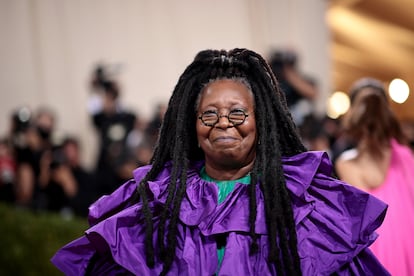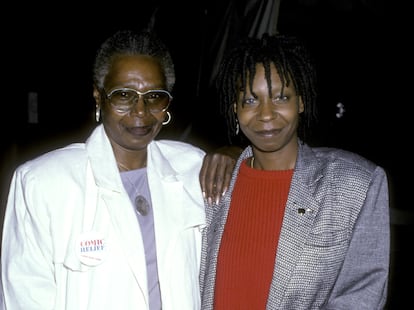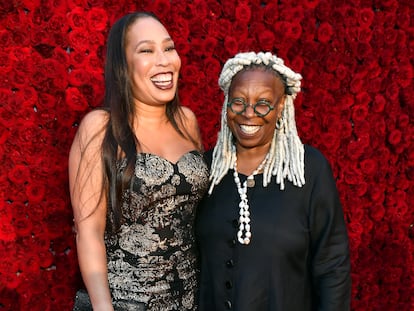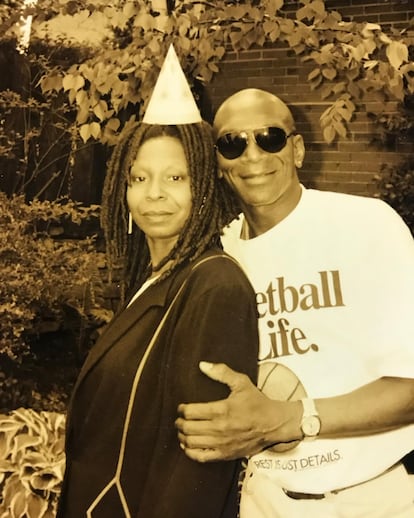Whoopi Goldberg reviews her life in memoir: From her mother’s electroshock therapy to becoming a grandmother at 34
In her book ‘Bits and Pieces’, the actress and presenter writes about her humble but happy childhood, and how her mother, who died in 2010, raised her and her brother all alone. ‘Having it all is as messy as you can get,’ she writes


Whoopi Goldberg knows that life is short, and doesn’t want to waste time. The New York actress, who has lived long and fast, will turn 69 on November 13, but had no intention of waiting till her 70th birthday to take stock of her life. On May 7, she released her memoir Bits and Pieces: My Mother, my Brother, and Me. The book’s title — along with the dedication (“This book is for all those who knew my mother and my brother”) — sums up the essence of the work: remembering her mother, Emma, who died suddenly in August 2010, and her brother, Clyde, who died even more unexpectedly in May 2015, aged 65. But the intimate portrait of her beloved family also includes Goldberg’s reflections on her personal and professional career.
In the memoir, the actress and TV presenter writes about the people who helped her rise to fame: from directors such as Mike Nichols and Steven Spielberg to actors Maggie Smith (who stayed with her for five hours in the dressing room of a London theater after she learned of her mother’s death, until she was able to leave for the United States); Elizabeth Taylor, with whom she maintained a loving friendship based on philanthropy (and who taught Goldberg to ask for a gift from each studio she worked for) and Marlon Brando, who after a telephone conversation appeared by surprise at her house playing the piano.
Goldberg — who was born Caryn Johnson — writes about her humble beginnings, being raised by a single mother (who never revealed her age) in the projects in the Chelsea neighborhood of New York. The actor’s journey is portrayed as that of a girl with a simple life, who was taught everything she knows about life by her mother, a woman ahead of her time, modern in her thinking and her way of living. A girl who was devastated by her mother’s death. It’s a journey, in which Goldberg also writes about her mistakes, successes, divorces, experiences of racism, battle with drug addiction and private family stories. And in which, despite everything, she defines herself as “the luckiest woman in the world.”
One of these intimate stories is particularly striking: in the memoir, Goldberg writes that, at one point in her childhood, her mother disappeared. She comes home from school and finds her mother in a strange state, as if she were lost. Her mother is taken to a hospital and disappears from her and her brother’s life for no less than two years. They hear nothing of her, and don’t know whether she will return or not.
Goldberg doesn’t remember much of what happened in the meantime, but she does remember that her father (a gay man, who never raised her or had much of a relationship with Goldberg) and her maternal grandfather (who also didn’t raise Emma) were the ones who admitted her mother to a medical center. When Emma returns, she is somewhat disoriented, according to the memoir, until everything returns to normal.
It is not until years later that Emma reveals what had happened to her. She tells her now-adult children that she had been put through electroshock therapy for years, which weakened her and damaged her memory. When she returned, she recognized them, but did not remember that they were her children. She never visited a doctor again, not even a dentist, and changed her profession from nursing to teaching. Goldberg takes solace in their early deaths by stating that this way she never had to make medical decisions for them.

Goldberg’s relationship with her mother has been the pillar of her life. Emma Johnson supported the actress from the start, using her limited resources to give her culture, education and a taste for the arts and books. In fact, Goldberg writes that she is often asked: “Why do you sound so white?” It’s a racist question that continues to surprise her, and that her mother put down to ignorance.
Her mother always supported her, even when she wanted to be an actress as a child. And when she became pregnant at age 18, and wanted to keep the child. A year earlier, Goldberg had married her drugs counselor Alvin Martin, who was helping her after she started taking drugs at age 16. The two separated shortly afterward. Goldberg has been married three times and has since said that being in a relationship is not for her. “Say to the next person: ‘No, thank you,’” her mother recommended.
Motherhood was not for her either. In the memoir, Goldberg acknowledges that she never forgot the physical pain of childbirth, nor her inability to breastfeed little Alex. She was very young when she became a mother and had barely started her career. “I just wanted to act, but I didn’t know how to build a career or how to get a job,” she says in her biography.
She wanted to be a film actress in Hollywood, but she started with theater in New York and then in Texas, before finally moving to California. She dragged her daughter to all these destinations until she finally got her break in New York, where — thanks to director Mike Nichols — she made the leap to Broadway. While on Broadway, she was spotted by Spielberg, who chose her for a role in The Color Purple. It was her first big movie opportunity, and landed Goldberg her first Oscar nomination. She would have to wait for her second — for her role as Oda Mae in Ghost (which screenwriters had opposed, but Patrick Swayze pushed for her) — to win the award.

As a young mother, Goldberg had to ask for social aid from the state of California — money which she later wanted to return. And then, for long periods of time, she did not see her daughter: It was her mother who took care of Alex. Emma left her New York apartment and flew to California (with just two paper bags as luggage, leaving everything behind, even her signed Beatles records and her children’s birth certificates). In the memoir, Goldberg acknowledges that she was not a perfect mother and that while she has a good relationship with her daughter now, she is not very maternal. “I would never win an award for best mother,” she writes.
“You can have it all. But you’ve got to walk away from the idea that it’s going to look like some movie. Having it all is as messy as you can get,” she continues. When Alex was just 15 years old, she became pregnant: on her 34th birthday, Whoopi Goldberg became a grandmother. She thinks it was her daughter’s “revenge” for the fact that she was away from home for so long. Years later, Alex told her that “she thinks she got pregnant as a teenager because she wanted a person who didn’t know who Whoopi Goldberg was.” Alex Martin today has three children and a granddaughter. In 2014, at 58 years of age, Goldberg became a great-grandmother.

In the 1980s, at the peak of her fame, Goldberg once again became addicted to drugs. For a year she was “a very high functioning adult,” until she started hallucinating, suffering from clumsiness, and staying in bed for 24 hours. In a hotel in New York, alone on her birthday, she was discovered by one of the cleaners, sitting on the floor with her face covered in cocaine. They were both scared of each other, and she was so ashamed that she stopped using hard drugs. Goldberg, however, continues to take marijuana and has even owned cannabis marketing companies. Fortunately, she managed to overcome her addiction very quickly.
When Emma died in 2010, Goldberg and her brother — who moved to California to be with his sister and mother — decided to throw her ashes in a place that made her happy: Disneyland Park, in south Los Angeles. It is a common. albeit prohibited, practice, and Goldberg says that she knew it would make her mother happy. Losing her brother just five years later to an aneurysm left her “stunned, but not surprised,” because she says part of Clyde’s essence was gone when their mother died. She was their pillar, and they were hers. “Because of my mom, I was able to go from being Caryn Johnson, the ‘little weird kid’ from the projects who no one ever expected to achieve all that much, to being me.”
Sign up for our weekly newsletter to get more English-language news coverage from EL PAÍS USA Edition
Tu suscripción se está usando en otro dispositivo
¿Quieres añadir otro usuario a tu suscripción?
Si continúas leyendo en este dispositivo, no se podrá leer en el otro.
FlechaTu suscripción se está usando en otro dispositivo y solo puedes acceder a EL PAÍS desde un dispositivo a la vez.
Si quieres compartir tu cuenta, cambia tu suscripción a la modalidad Premium, así podrás añadir otro usuario. Cada uno accederá con su propia cuenta de email, lo que os permitirá personalizar vuestra experiencia en EL PAÍS.
¿Tienes una suscripción de empresa? Accede aquí para contratar más cuentas.
En el caso de no saber quién está usando tu cuenta, te recomendamos cambiar tu contraseña aquí.
Si decides continuar compartiendo tu cuenta, este mensaje se mostrará en tu dispositivo y en el de la otra persona que está usando tu cuenta de forma indefinida, afectando a tu experiencia de lectura. Puedes consultar aquí los términos y condiciones de la suscripción digital.








































